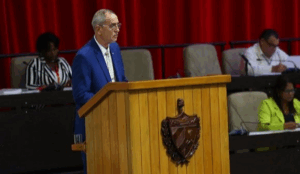 Havana, Cuba.- Cuban Minister of Economy and Planning Joaquín Alonso explained to deputies of the National Assembly of People’s Power this Wednesday the challenges facing the sector amid the US siege.
Havana, Cuba.- Cuban Minister of Economy and Planning Joaquín Alonso explained to deputies of the National Assembly of People’s Power this Wednesday the challenges facing the sector amid the US siege.
During the parliament’s Fifth Session, the minister asserted that the Cuban economy has been marked by the transformations of the Ordering Task, the negative effects of the COVID-19 pandemic, and the irrational, inhumane, and genocidal economic war waged by the United States government.
According to Alonso, these variables, coupled with the global economic crisis, burden and make it difficult to fulfill plans, projections, and strategies. Added to this, he said, are “errors, deviations, and negative trends that also affect the conduct of the economy, both at the macro and microeconomic levels.”
In this context, he confirmed that the United States’ economic, commercial, and financial siege has intensified in recent years, even more so with the recent approval of the presidential memorandum reinforcing economic sanctions, violating the rights of the Cuban people.
“This undeclared war is the main obstacle to our economic and social development, with damages exceeding $6 billion annually, affecting access to external resources, exports of goods and services, foreign direct investment, access to external credit, and remittances, limiting the reactivation of the productive base and the satisfaction of the population’s basic needs,” he stated.
According to the minister, these factors generate “internal imbalances that manifest themselves in inflationary pressures, a fragmented foreign exchange market, and critical restrictions on the availability of foreign currency, fuel, and electricity, hampering industrial and productive activity and essential services.”
Alonso reported that in 2024, the gross domestic product (GDP) registered a decrease at constant prices of 1.1%, slightly lower than that recorded in 2023, but maintaining the trend of economic contraction, reflected in the decline in sectors such as agriculture and manufacturing.
Despite this, the minister said that the government “is working continuously on the study, design, implementation, and implementation of a set of transformations to correct distortions and boost the economy in 2025.”
The prioritized objectives of the 2025 Economic Plan, reflected in the government program, have been aimed at continuing to advance macroeconomic stabilization, increasing the country’s external revenue, boosting national production, with an emphasis on food, and securing resources for defense and internal order, he stated.
He explained that the country is seeking to gradually recover the national electricity system (SEN) by modifying the energy matrix, a prioritized objective.
These projects also include addressing social policy priorities, with special attention to individuals, families, households, and communities in vulnerable situations, and incorporating the contributions of science, technology, and innovation into economic recovery.
“The limited financial resources available to the country during this period have been concentrated on paying for food, fuel, maintenance, recovery, and capacity building for the SEN, medicines, defense, and national security, making their operational management extremely complex in a crisis management context,” he noted.